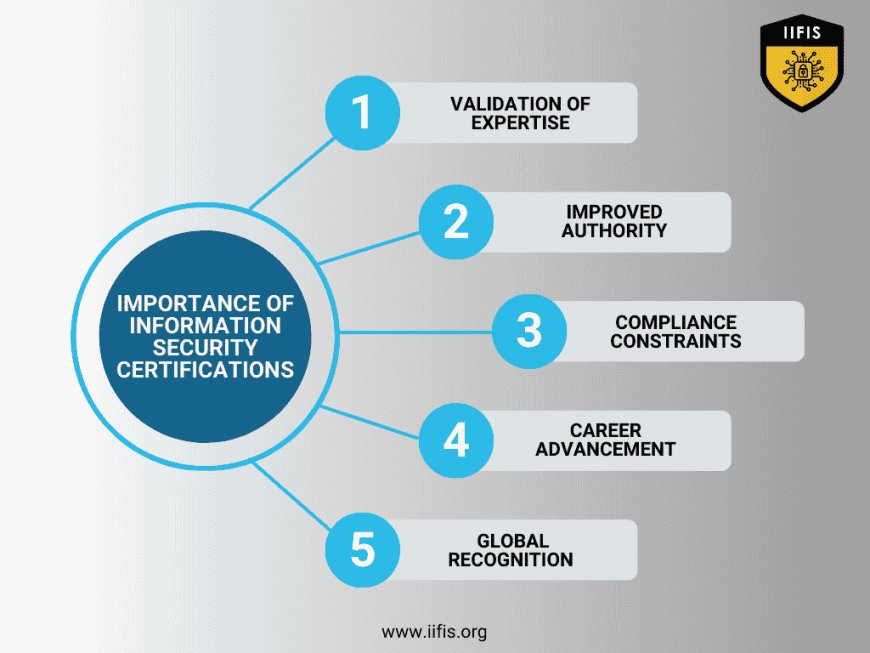The Importance of Information Security Certifications
Discover the significance of information security certifications for safeguarding digital assets. Learn why certifications matter in cybersecurity.

Information Security is more important than ever in programs, as digital data serves for everything from financial transactions to communication. Organizations of every size and type are at risk from cybersecurity, which includes hackers and malicious software. The demand for information security specialists has increased as a result of this increased danger. Assume the role of a business owner. Digital storage is used to keep your financial records, client information, and even creativity. Imagine now if someone has access to the data without authorization or does something with it. The impacts might be devastating, ranging from financial loss to reputational damage
It's difficult to navigate the information security environment. This area requires both academic understanding and practical skills due to its complexity and constant changes. Employers want reassurance that their information security staff is capable of successfully defending against cyber threats and safeguarding sensitive data.
To put it simply, experts in information security must comprehend not only the theory behind cybersecurity but also how to implement it in practical settings. To stay in front of future dangers, they need to stay current on the newest methods and trends. Companies seek candidates who can demonstrate these skills, giving them peace of mind that their data is safe.
Importance of Information Security Certifications:
1. Validation of Expertise: A person's competence in a range of cybersecurity disciplines is confirmed by information security certifications, including Certified Information Systems Security Professional (CISSP), Certified Ethical Hacker (CEH), and Certified Information Security Manager (CISM). These qualifications show a commitment to lifelong learning and keeping up with the most recent developments in the business sector in terms of trends and technologies.
2. Improved Authority: Possessing reputable information security qualifications makes a person more credible and employable. Candidates with pertinent certificates are frequently given preference by employers, who see them as more dependable and qualified to occupy important positions in their companies.
3. Compliance constraints: Organizations must maintain strong information security procedures to protect sensitive data in several industries due to legal constraints. Regulatory agencies and other interested parties might be reassured by information security certificates that the company employs trained personnel who can establish and maintain efficient security measures.
4. Career Advancement: In the cybersecurity field, information security certifications provide access to new job prospects and career paths. Professionals with certifications are frequently ineligible for leadership positions and higher-paying jobs because they are thought to possess the necessary knowledge and abilities to spearhead security initiatives and increase organisational resistance to fraud.
5. Global Recognition: Many information security certifications are globally recognized, allowing professionals to demonstrate their proficiency on an international scale. This global recognition is particularly valuable in today's interconnected business environment, where organizations operate across borders and face diverse cyber threats.

information security certifications are essential for confirming the abilities, know-how, and proficiency of individuals working in the field of cybersecurity. Acquiring reputable certificates improves a person's credibility and marketability while strengthening an organization's defences against cyberattacks. Getting certified is becoming more and more important for people who want to succeed in this vital and ever-changing field of information security.
How do Information Security Certifications Benefit Individuals and Organizations?
Certainly, here's how Information Security Certifications benefit both individuals and organizations:
1. Enhanced Knowledge and Skills: Information security certifications offer thorough instruction and training in a range of cybersecurity-related topics. Holders of certifications acquire in-depth knowledge of security principles, instruments, and best practices through demanding courses and examinations. Thanks to their expanded skill set, they are better equipped to recognize, evaluate, and address security threats inside their companies.
2. Verification of Expertise and Credibility: Getting an acknowledged information security certification is a concrete indication of a person's proficiency and commitment to the cybersecurity industry. Holders of certifications go through demanding evaluation procedures that confirm their knowledge and reliability in the eyes of employers and peers. This affirmation strengthens their sense of trust and confidence in their capacity to successfully manage security concerns.
3. Compliance with Regulatory Requirements: Many certifications in information security are in line with business standards and regulatory frameworks, including GDPR, ISO/IEC 27001, and the NIST Cybersecurity Framework. By obtaining these certifications, organizations can show their dedication to adhering to pertinent rules and regulations governing data protection and information security. This builds confidence among stakeholders and customers while also reducing legal and regulatory concerns.
4. Improved Risk Management and Incident Response: Qualified individuals have the know-how to proactively find weaknesses, evaluate risks, and put strong security measures in place. They are skilled at creating and putting into practice security measures, keeping an eye on systems for questionable activity, and reacting quickly to security events. By proactively managing risk, companies may reduce the possibility and damage of cybersecurity breaches, protecting
5. Competitive Advantage and Market Differentiation: Businesses that spend money on information security certifications can stand out from the competition. A dedication to upholding strict security and professionalism standards is demonstrated by certification, which can draw in partners, investors, and clients that place a high value on risk reduction and data protection. Furthermore, as certification denotes a better degree of competence and dependability than uncertified competitors, it might be a differentiator in procurement procedures.
6. Cost Savings and Efficiency: By hiring qualified specialists, companies may lower the risk of security lapses and the resulting financial damages. The skills of certified specialists include process optimization, incident response streamlining, and the implementation of affordable security solutions. This results in decreased incident resolution costs, increased operational efficiency, and overall savings on cybersecurity expenses.
Certifications in information security are essential for protecting people and companies from the constantly changing world of cyber threats. These credentials are evidence of a person's knowledge, devotion, and passion for the cybersecurity industry. Certifications improve a person's knowledge and abilities while also confirming their legitimacy and employability.
Investing in certified experts offers firms a host of benefits, such as higher regulatory compliance, better risk management, and a competitive advantage in the marketplace. Furthermore, with the implementation of economical security solutions and the streamlining of incident response procedures, trained experts save money and improve operational effectiveness.
It is impossible to overestimate the significance of information security certifications given the increasing reliance on digital technology. They guarantee that people and organizations remain ahead of cyber adversaries by offering a framework for ongoing learning and adaptation to new threats. A more secure and resilient digital future is made possible by people and businesses adopting information security certifications.
























